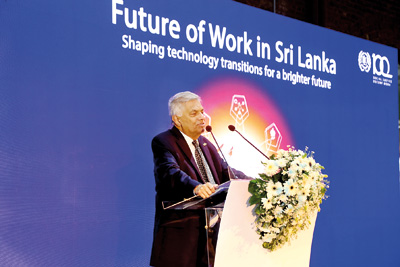Services sector to transform the Sri Lankan job space

Prime Minister Ranil Wickremesinghe speaks at the launch of the report.
Sri Lanka will make a leap frog into the services sector in the future of the world of work in the wake of the changes in the fourth industrial revolution that would involve the digital space and a shift out of its more favoured agriculture and plantations sectors.
The country has seen a sharp reduction in the number of workers on the plantations and this number is also dwindling within the agriculture sector as well and without shifting into the manufacturing sector that is the common area of movement according to classical theorists on the jobs sector, there would be a shift towards the services sector, ILO Country Director Simrin Singh told the Business Times in an interview on Tuesday at the ILO office in Colombo.
The future of work is a conversation that has started around the world and the disruption created around it as a result of the emerging technologies and in this context Sri Lanka is considered unique by one of the experts of the report on “Future of Work” Director Dr. Vikrom Mathur said.
He noted that Sri Lanka’s agricultural and plantation sectors were not deeply impacted by technology due to the fact that the future of jobs in these two sectors were redundant and that contributes only about 7 per cent to the GDP of the economy and generates about 25 per cent of employment.
With a low use of technology on the plantations and people already leaving this sector it is unlikely to be impacted by the fourth industrial revolution of technological transition.
On the contrary the future of work in Sri Lanka is mostly found in the services sector like in the care sector that would increase the number of jobs for taking care of the growing elderly population and the child care market.
In addition, the decentralised tourism is said to have a high potential in future and moreover, Sri Lanka has been identified to having a unique position in the green economy, Dr. Mathur noted.
There would be increased opportunities for self-employment allowing for those unable to enter the job market, it was noted.
In the services sector, the country needs to identify with the IT services sector in particular in the areas of Artificial Intelligence, data analytics among others.
Sri Lanka’s scenario is what is in an emerged country with low female participation in the workforce; similar to developed and also South Asian countries. In terms of the demographics the country is also like Japan with an ageing population and 60 per cent of those in employment found in the informal sector.
In view of the higher standard of education available for free and improved health care services, there is difficulty in finding youth for the low end manual jobs on the other hand most would prefer routine jobs that are likely to get automated going forward.
A heavy investment in ensuring that people are provided skills training is something that the government needs to engage in.
The good jobs which are those that provide a security for the future of employees will be lost and a lot of transformation will happen in the services sector.
Commenting on the low female participation in the workforce, Ms. Singh explained that culture played a key role in ensuring that few females took up jobs especially after they get married and have children.
In this respect, the government needs to bring about the necessary labour laws in place, to remove discrimination at the workplace, increase security of women workers travelling to work and even while there.
Moreover, working from home is considered to be an issue as this would mean adding to the already existing household and child care work that women as mothers and housewives are engaged in, it was noted.
But even then the opportunities to work from home should be encouraged and even getting them back to work through self-employment projects becoming part of the workforce and simultaneously work on the labour laws as well.
The report launched by the ILO takes a careful study into the aspects of digital space taking over the different sectors of employment and the scenario in terms of Sri Lanka’s current situation. In this context it was found that Sri Lanka continues to enjoy a higher level of education and healthcare but continued to be more expensive in terms of jobs and lacked the ability to compete with neighbouring states like India and Bangladesh and that some of its key sectors like agriculture and plantations would become a thing of the past while other sectors like services there could be a radical transformation although robotics is hard to replace the human touch yet in the country.


